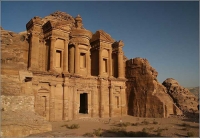| 约旦 Jordan 首都:安曼 国家代码: jo |
|
约旦哈希姆王国(阿拉伯语: الأردنّ )是中东的一个国家,它北临是叙利亚,东临伊拉克,东南临沙特阿拉伯,西临以色列和巴勒斯坦。
历史 古代约旦 约旦作为一个独立国家的根源可以追溯到纳巴特王国,这是由纳巴泰人(阿拉伯文: الأنباط )建立的。他们宽松的贸易管理网络以一串绿洲为中心点,但中心点没有足够范围作集体农业,而绿洲间的通路在荒漠周遭毫无防线。 在今天约旦的国土上,人类在数千年前就已经建立了古老的文明。约旦原是巴勒斯坦的一部分。先后被亚述、巴比伦、波斯和马其顿统治。7世纪属阿拉伯帝国版图。16世纪归属奥斯曼帝国。 现代约旦 第一次世界大战后约旦由英国代国际联盟管理。1921年,英国以约旦河为边界,把巴勒斯坦分为东西两部分,西部仍称巴勒斯坦,东部称外约旦。英国在这里设立了一个半自主的苏旦国,立汉志国王侯赛因次子阿卜杜拉一世为外约旦酋长国酋长。1946年5月25日约旦获得独立,阿卜杜拉登基为王(埃米尔),国名为外约旦哈希姆王国。1950年4月,约旦河西岸和东岸合并称为约旦哈希姆王国。 约旦支持巴勒斯坦人反对建立以色列。它参加阿拉伯国家联合对以色列的战争,在阿拉伯国家战败后,约旦获得了对西岸的控制。1967年约旦又与埃及、叙利亚和伊拉克一起对以作战。以色列占领了西岸以及整个耶路撒冷。在两次战争后都有大量巴勒斯坦难民逃到约旦。这使巴勒斯坦人在约旦的势力大为增加。这个势力的增加使约旦的王室非常不安。1970年,在巴勒斯坦解放组织多次劫机后,约旦开始对他们开火。这场战斗影响到整个阿拉伯社会。叙利亚在约旦的北部边境上集中坦克部队以对约旦施加压力。1970年9月22日在在开罗的阿拉伯国家外交部长会议的调停下双方熄火。但此后还一直有小的战斗发生。一直到1971年7月约旦将巴勒斯坦解放组织逐出其国境。 在1973年的阿拉伯—以色列战争中约以边境上没有战火。但约旦派出一个旅的兵力进入叙利亚抵抗那里的以色列军队。约旦没有参加1991年的海湾战争。 政治 约旦独立后的大多数时间里其首领是侯赛因国王。约旦地处一个政治上非常不稳定的地方,许多政治力量在这里逐鹿:美国、苏联、英国、以色列、各个阿拉伯国家以及约旦本国内的一个数量非常巨大的巴勒斯坦移民。在这些政治力量和兴趣中侯塞因试图寻找一条可行的路,他的政策保障了约旦的主权和统一。虽然中东在这些时间里经历了多次战争和动荡,约旦基本上能够保持社会稳定。侯赛因本人是多次刺杀的对象。1989年他恢复了约旦的国会选举,1994年他签署了与以色列的和平条约。 行政划分 约旦分二十二个省。每一个省长是由国王任命的。 省 人口 (2008 统计) 首府 人口 (城市, 2008 统计) 阿杰隆省 118,496 阿杰隆 8,161 安曼省 1,939,405 安曼 1,135,733 亚喀巴省 107,115 亚喀巴 95,408 拜勒加省 349,580 萨勒特 87,778 伊尔比德省 950,700 伊尔比德 650,000 杰拉什省 156,680 杰拉什 39,540 卡拉克省 214,225 卡拉克 22,580 马安省 103,920 马安 30,050 马代巴省 135,890 马代巴 83,180 马弗拉克省 245,670 马弗拉克 56,340 塔菲拉省 81,000 塔菲拉 扎尔卡省 838,250 扎尔卡 447,880 每一个省是分成52个街道 ("nahias"; 阿拉伯语:ناحية) 的。 地理 约旦大部分地区是沙漠。西部是高地,被亚巴琳山脉贯穿。全国可耕地只占全国面积的4%。在亚喀巴湾约旦有一小段海岸线。死海位于约旦的西部,是其与以色列的边境的一部分。 经济 约旦是一个比较小的阿拉伯国家,全国缺水,也没有石油之类的自然矿产品。1991年的第一次海湾战争给约旦的经济带来了极大的困难。约旦被迫停止偿还它的债务。约旦国内的大批巴勒斯坦难民、其它海湾国家对约旦的资助、其去他国工作的工民都给约旦的经济带来了极大的混乱。使得整个国家的经济非常不稳定和复杂。 阿卜杜拉二世国王试图对国家经济进行有限的改革,其中包括将一些国营企业私有化。债务、贫困和失业依然是约旦最大的经济困难。 人口 约旦人口中98%是阿拉伯人。 92%信仰逊尼派穆斯林教,6%基督教。 36.6%的人口小于14岁,3.4%老于64岁。 人口增长率是2.89%。婴儿死亡率是1.961%。期望寿命为77.71岁。 对外政策 约旦和西方有密切的关系,尤其是英国和美国。海湾战争时,因为约旦继续支持伊拉克,他和西方的关系稍微弱化,但是到现在为止,美国是提供给约旦援助最大的国家。1994年,约旦和以色列达成了和平协议,到现在为止在阿拉伯国家中只有它和埃及提出一项和平协议。伊拉克战争时,萨达姆的政府崩溃以后,约旦扮演关键的角色,对伊拉克的安全和稳定提出了很大的贡献。 During its history, Jordan has seen numerous civilizations, including such ancient eastern ones as the Canaanite and later other Semitic peoples such as the Edomites, and the Moabites. Other civilizations possessing political sovereignty and influence in Jordan were: Akkadian, Assyrian, Judean, Babylonian, and Persian empires. Jordan was for a time part of Pharaonic Egypt, the Hasmonean Dynasty of the Maccabees, and also spawned the native Nabatean civilization which left rich archaeological remains at Petra. Cultures from the west also left their mark, such as the Macedonian, Roman, Byzantine, and Ottoman Turkish empires. Since the seventh century the area has been under Muslim and Arab cultures, with the exception of a brief period when the west of the area formed part of the Crusader Kingdom of Jerusalem and a short time under British rule. The Hashemite Kingdom of Jordan is a constitutional monarchy with representative government. The reigning monarch is the head of state, the chief executive and the commander-in-chief of the armed forces. The king exercises his executive authority through the prime ministers and the Council of Ministers, or cabinet. The cabinet, meanwhile, is responsible before the democratically elected House of Deputies which, along with the House of Notables (Senate), constitutes the legislative branch of the government. The judicial branch is an independent branch of the government. Jordan is a modern Arab nation with a predominantly middle class population that lacks the vast wealth of some of its neighbors. Jordan's population is 92% Sunni Muslim with a small Christian minority. Jordanian society is predominantly urbanized and very ethnically diverse. Jordan is classified as an emerging market by the CIA World Fact Book. Jordan is a pro-Western regime that has very close relations with the West especially with the United States, the United Kingdom and France. Jordan became a major non-NATO ally in 1996. Jordan is one of only two Arab nations, the other being Egypt, that has diplomatic relations with Israel. It is a founding member of the Arab League and the CAEU, a member of the OIC, the WTO, the AFESD, the Arab Parliament, the AIDMO, the AMF, the IMF, the International Criminal Court, the UNHRC, the GAFTA, the ESCWA, the ENP and the United Nations. Jordan is also currently undergoing close integration with the European Union and the Gulf Cooperation Council. Jordan expects to receive "advanced status" with the EU by 2011. |
|
